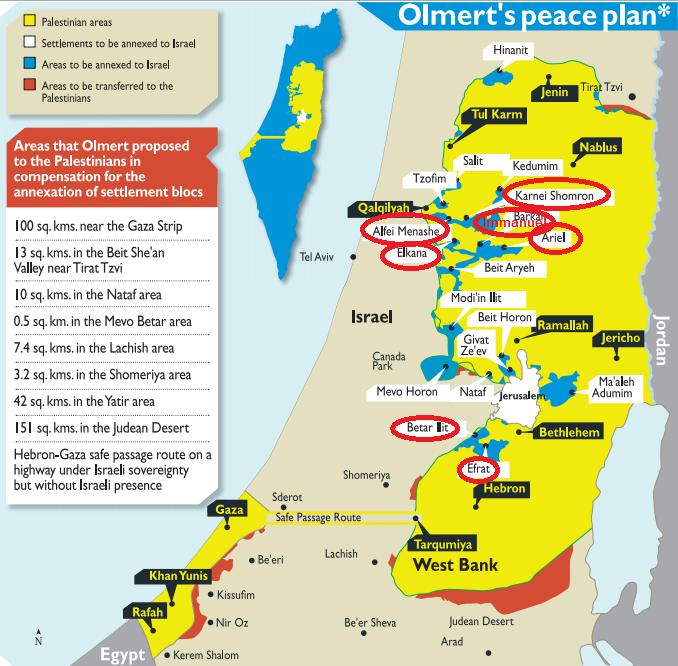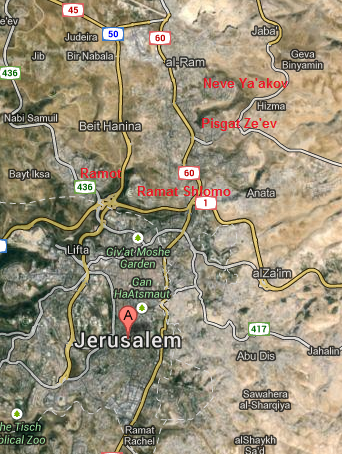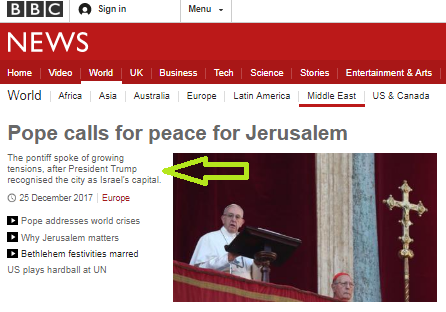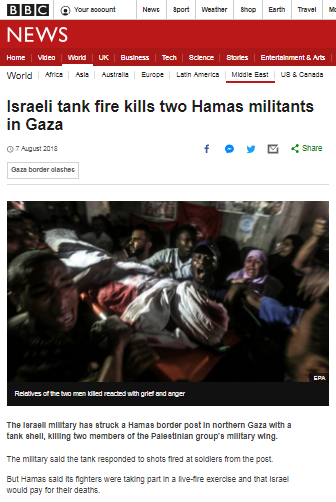On January 10th the BBC News website’s Middle East page featured a report titled “Israel announces plans for 1,400 new settlement homes” which remained on that page for a total of five consecutive days.
The article includes the usual BBC mantras which fail to adequately inform readers of the fact that there are many differing (and by no means exclusively Israeli) opinions on the issue of the legal status of communities and neighbourhoods situated beyond the 1949 armistice line, including the one recently expressed by the Australian foreign minister.
“About 500,000 Jews live in more than 100 settlements built since Israel’s 1967 occupation of the West Bank and East Jerusalem. The settlements are considered illegal under international law, though Israel disputes this.”
It also misleads audiences by inaccurately suggesting that residents of those neighbourhoods of Jerusalem which the BBC chooses to define as “Jewish settlements” are exclusively Jews.
The article also once again misleads readers with regard to the reasons for the breakdown in previous negotiations.
“A dispute over settlement construction led to the collapse of the last talks.”
In fact, that “collapse” of talks in September 2010 came as a result of the Palestinian Authority’s refusal to continue direct negotiations when a ten-month freeze on construction implemented by Israel as a ‘goodwill gesture’ – and ignored by the PA for 90% of its duration – came to an end.
The report states that:
“On Friday, Israel’s housing ministry issued tenders for the construction of 801 housing units in West Bank settlements, including Efrat, Elkana and Emanuel, and 600 in Ramat Shlomo in East Jerusalem.
The ministry also re-issued tenders for a further 532 homes in East Jerusalem that had previously failed to attract bids from contractors.”
The re-issued tenders are situated in Pisgat Ze’ev (182 units), Ramot (294 units) and Neve Ya’akov (56 units) all of which – like Ramat Shlomo (600 units) – are neighbourhoods of Jerusalem. The additional tenders are for Efrat (227 units), Alfei Menashe (78 units), Karnei Shomron (86 units), Ariel (40 units), Beitar Illit (24 units), Emanuel (also spelt Immanuel -102 units) and Elkana (169 units).
In other words, the BBC’s definition of “settlements” in “East Jerusalem” includes a neighbourhood established by Jews on land they purchased in 1924 – Neve Ya’akov – which had to be abandoned in 1948 when the area was conquered and occupied by the British financed and led Jordanian Arab Legion.
Were the BBC to report impartially on this subject, it would have to make it clear to readers that all of those locations above lie in districts which, according to any reasonable assessment of a possible future agreement between Israel and the PLO, would remain under Israeli control. However, that fact is not clarified to BBC audiences.
Instead, the report adopts and amplifies the PA narrative through the use of various quotes.
“Palestinian negotiator Saeb Erekat said it showed “Israel’s clear commitment to the destruction of peace efforts”.” […]
“The settlement watchdog, Peace Now, said that since the direct peace talks resumed, Israel had announced plans for 5,439 settlement homes.
“These latest tenders could cause negotiations to break down and destroy Kerry’s efforts,” said Peace Now’s general secretary, Yariv Oppenheimer.”
“Mr Erekat, a member of the Palestine Liberation Organisation (PLO) executive committee and its chief negotiator at the peace talks, said the Israeli government was “openly displaying its true agenda”.
“The announcement of yet more settlement units at this particular moment is a test for the US administration’s ability to hold Israel accountable for actively sabotaging their efforts for peace,” he added.”
So, rather than providing BBC audiences with a realistic view of the lack of any real significance of these building tenders on the possibility of the creation of a future Palestinian state, the BBC elects to adopt and amplify the unrealistic narrative whereby any proposed building whatsoever – including in areas which even the PA knows will undoubtedly remain under Israeli control – is presented as an event with ‘life-threatening’ effects on negotiations.
Whilst that approach is undoubtedly useful for the purpose of advancing the supporting narrative to a specific political agenda, it does nothing to help fulfill the BBC’s obligation to “build a global understanding of international issues” and “enable individuals to participate in the global debate on significant international issues”.
Related Articles:
BBC continues to promote Israeli building as sole impediment to peace talks
BBC report on building tenders presented in one-sided political terminology
BBC’s ‘Israeli building threatens peace talks’ meme in numbers







